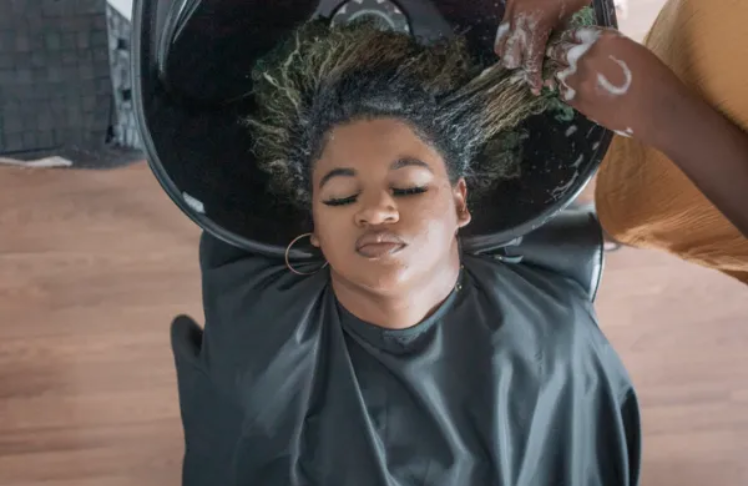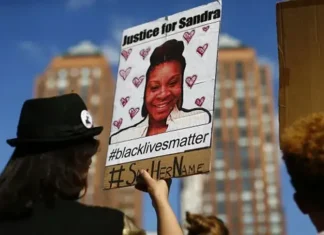
During the past two years, the federal Food and Drug Administration pledged it would protect consumers from two harmful chemical ingredients in products that are used by millions of Americans — particularly Black Americans — every day.
But the regulatory agency’s steps toward banning formaldehyde in hair relaxers and menthol as an ingredient in cigars and cigarettes looks more like a cha-cha slide than a race to improve Black health.
For decades, as study after study linked both of those chemicals to poor health outcomes for Black consumers — including potentially deadly diseases — the agency did little to get them off the market.
In fact, the FDA has missed its own deadlines for proposed bans on menthol-flavored cigarettes and formaldehyde in hair-smoothing products.
As a result, Black women with straightened or relaxed hair remained at heightened risk for developing cancer or other health problems at the hair salon. And Black smokers, who overwhelmingly prefer menthol in their tobacco products, are more likely to develop smoking-related diseases, including heart disease, lung cancer or stroke — and face a much tougher struggle if they want to quit.
Last year, Democratic Reps. Ayanna Pressley of Massachusetts and Shontel Brown of Ohio, who are both Black women, sent a joint letter to the FDA commissioner urging more regulation over hair relaxers marketed toward Black women.
“As a result of anti-Black hair sentiment, Black women have been unfairly subjected to scrutiny and forced to navigate the extreme politicization of hair,” Brown and Pressley wrote. “Hence, generations of Black women have adapted by straightening hair in an attempt to achieve social and economic advancement.”
Last year, the FDA announced that after decades of research showing the dangers of formaldehyde in hair care products it would move to prevent the chemical’s use in traditional hair relaxers and keratin-based products.
A known carcinogen, formaldehyde is a common ingredient in “no-lye” relaxers and similar products, such as “Brazilian blowouts” and other keratin treatments. But the chemical, which produces fumes in salon products, is a health hazard if inhaled and can cause damage eyes or skin with direct contact, according to the FDA.
In 2021 and 2022, research from Boston University’s Black Women’s Health Study showed an increased risk of hormone-related cancers, including breast and uterine cancer, among women with long-term use of chemical relaxers. As part of the study, almost 45,000 women with an intact uterus who self-identified as Black were followed from 1997, when participants were first asked about chemical hair relaxer use, until 2019.
A vast number of Black women have been, or continue to be, exposed to this risk: researchers found that up to 95% of participants the Black Women’s Health Study reported having used hair relaxers at some point in their lifetime.
The FDA began investigating the issue in 2011, when the nonprofit Environmental Working Group petitioned the agency to ban formaldehyde in hair straighteners and require manufacturers to add warning labels on product packaging. The same year, the agency issued warning letters to manufacturers of keratin-labeled hair-smoothing products containing formaldehyde, citing violations of federal safety standards.
But this April, the FDA again missed its own April 2024 deadline for issuing the new rule to actually ban the chemicals for use in cosmetics — and it hasn’t said anything about setting a new one.
”The FDA has been working on a proposed rule to ban formaldehyde and formaldehyde-releasing chemicals in hair smoothing and hair straightening products,” the FDA said when asked for a new timeline. “The formaldehyde proposed rule continues to be a high priority and is still in the rulemaking process.”
But hair-straightening manufacturers argue that formaldehyde is better at smoothing hair and is safer than alternative ingredients. They also contend that the new regulations could increase costs and limit consumer choice.
Meanwhile, smoking is the number one preventable cause of death in the U.S., killing over 480,000 people per year, according to the Centers for Disease Control. The dangers and disparities surrounding menthol cigarettes have been well-known for decades.
Nearly 85% of Black smokers choose menthol cigarettes, compared to 34%t of white smokers. And the tobacco industry has targeted the marketing of menthol cigarettes at Black communities for decades.
The FDA banned flavored cigarettes and cigars in 2009, but caved when tobacco lobbyists fought to keep menthol cigarettes on the market. In 2021, menthol cigarettes accounted for 37% of all U.S. cigarette sales, according to the CDC. Menthol enhances the effects of nicotine on the brain and can make tobacco products even more addictive than non-menthol cigarettes.
Because the cooling sensation of menthol can mask the harshness of tobacco smoke new smokers — especially teens — are more likely to start smoking them. For decades, health advocates and community groups have pushed for the FDA to ban them as it has other flavored tobacco products. And in April 2022, the FDA announced its intent to ban menthol-flavored cigarettes and cigars.
However, the proposed ban has faced stiff opposition from various quarters — including Big Tobacco and some consumer groups. The final rule was expected to be issued last August but that deadline has come and gone.
Although the menthol ban is still in limbo, the Department of Health and Human Services earlier this year launched a “framework” of goals and strategies “to support and accelerate smoking cessation and reduce smoking- and cessation-related disparities.”
However, “when it comes to menthol-flavored cigarettes, we do not have additional information to share at this time,” the FDA says.















